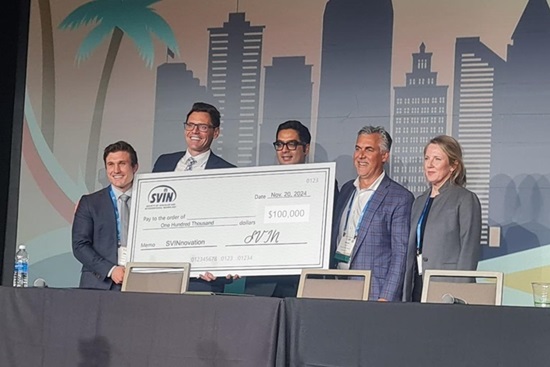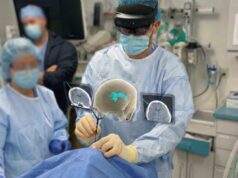
A novel catheter intended to improve on the tools currently available in neurosurgical external ventricular drain (EVD) placement was awarded a US$100,000 grand prize at this year’s Society of Vascular and Interventional Neurology (SVIN) annual meeting (20–22 November, San Diego, USA).
The SoundPass device—conceived and developed by a team of medical students from the University of Utah (Salt Lake City, USA)—was ultimately selected by an entrepreneurial panel of judges to receive this award ahead of three other technologies also showcased during the meeting’s SVINnovation session.
SoundPass co-founder Matt Findlay (University of Utah, Salt Lake City, USA) presented his team’s technology to the panel at SVIN 2024, stating that it was predicated on the idea that ‘two passes are too many’ when it comes to EVD catheter access for neurosurgical drainage of cerebrospinal fluid (CSF).
With the addition of an ultrasound transducer component at its tip, the SoundPass catheter is designed to provide real-time visualisation and—by minimising the number of required passes—ultimately reduce the likelihood of complications during EVD placement procedures. Findlay and his colleagues anticipate that this will help to add a new level of precision within a neurosurgical operation that is among the most common in the USA, but is typically performed ‘blindly’ without imaging guidance.
As the winner of the SVINnovation grand prize, Findlay and the SoundPass team took home US$75,000 in cash in addition to US$25,000 in complimentary consulting services and mentorship from industry experts at Brainstorme, Project Medtech, and Medical Device Global Regulatory Consulting (MCRA). SoundPass will also gain exposure in the journal Stroke: Vascular and Interventional Neurology and on the SVIN’s website in the coming weeks.
“We are deeply honoured and thrilled to receive the SVINnovation prize. We extend our sincere gratitude to the SVIN, its members, and the judges, for recognising our work. In the fast-paced world of startups, maintaining momentum is vital, and this funding will significantly accelerate our efforts to bring this innovative device to patients’ bedsides,” Findlay told NeuroNews. “The funding will play a pivotal role in advancing our next major milestones, including cadaver and live animal studies to refine and validate our working prototypes. These crucial steps will not only accelerate our progress but also bring us closer to delivering life-changing solutions to patients.”
Presenting the award to Findlay following the judging panel’s decision, VonVascular.io chief executive officer (CEO) Manning Hanser cited the SoundPass team’s “clear and easy” proposed pathway to US Food and Drug Administration (FDA) 510(k) clearance, and praised the single-use nature of the device as well as the fact that it targets novice users and experienced neurosurgeons alike. Hanser also said he hopes the funds will enable the group to grow and add new areas of expertise to its “awesome” academic team.
The first of three other novel concepts presented during the SVINnovation session was Quantanosis.ai. Showcased by its co-founder Ameer Hassan (Valley Baptist Medical Center, Harlingen, USA) at SVIN 2024, the company’s technology intends to use artificial intelligence (AI)-powered diagnostics and a head-mounted helmet to break up neurovascular clots quickly and accurately—but also completely non-invasively—via histotripsy. With this operator-independent and portable solution, Quantanosis.ai’s goal is to “democratise” stroke treatment.
Following this, Shashvat Desai (HonorHealth, Scottsdale, USA) outlined the potential of a two-pronged solution to the global burden of hypertension. The technology in question incorporates an endovascular stent-like device capable of continuously monitoring intra-arterial blood pressure (SomaSense), and an electronic system designed to modulate the carotid sinus and control pressure levels in response to these monitoring data (SomaSafe). Desai concluded by noting that this proactive, real-time, personalised technology could improve compliance to treatment of “the worst disease mankind suffers from”.
Neuronics Medical CEO and co-founder Radoslav Raychev (University of California Los Angeles [UCLA] Health, Los Angeles, USA) gave the session’s fourth and final pitch, showcasing his company’s FAST.AI smartphone application—which utilises machine learning algorithms with the goal of autonomously yet reliably detecting patients’ physical signs of stroke. With the technology having already demonstrated promising preliminary results in a real-world study, Raychev’s hope is that FAST.AI can detect signals like facial asymmetry, arm weakness and speech changes with accuracy comparable to an actual neurologist’s clinical impression.









